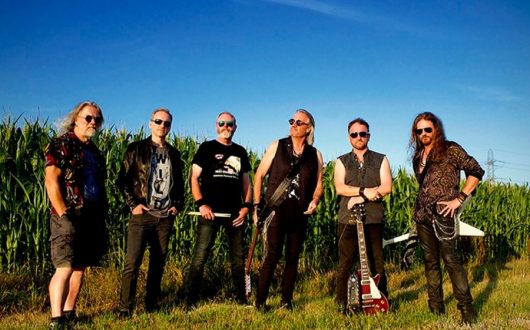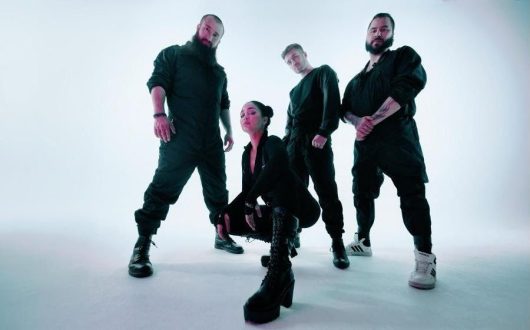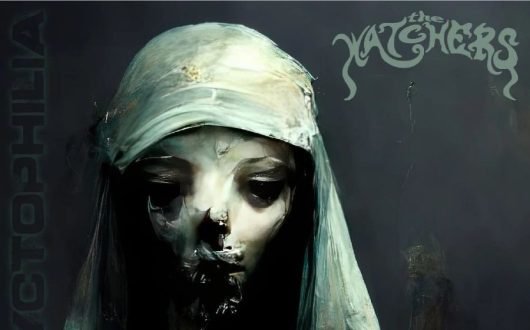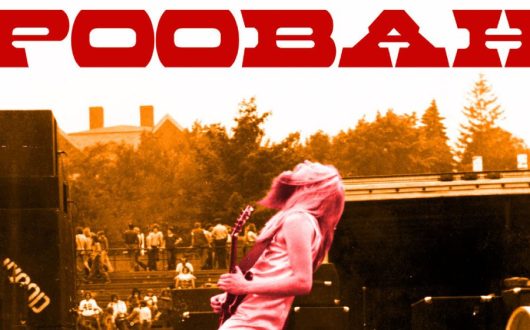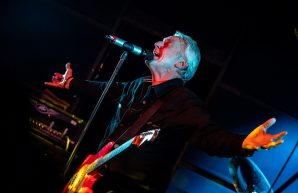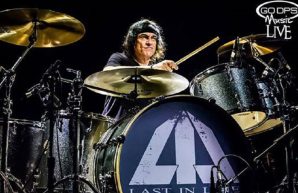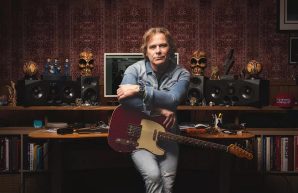Interview by Mark Lacey
Live Photos: Mindhex Media
For over 25 years, Jim Kirkpatrick has built a huge reputation for his versatility, his talents as a songwriter, and his slide guitar and fingerpicking style – with some boldly referring to him as “England’s Joe Bonamassa”. Across his career, Jim has embraced a diverse range of styles, although he is probably best known as Bernie Marsden’s sideman, as well as for his work with John ‘Rhino’ Edwards, and his lengthy tenure as FM’s lead guitarist. FM’s forthcoming 40th anniversary will make 2024 a busy year, but with Jim’s most recent solo album ‘Dead Man Walking’ being lauded as his finest work, there is a strong demand for him to deliver solo dates as part of his touring schedule.
MGM: For the last fifteen years, you’re probably best known for being the lead guitarist in FM, but your career goes back a lot further. How did you first become a professional musician and solo artist?
Jim: What I’m doing with my solo albums now was probably what I wanted to do 25 years ago, but I was fortunate that I kept getting called by people to work as a session player. My own career just kept taking a backseat all the time. I was working with a singer-songwriter called Thea Gilmore, because we lived near to each other. Her stuff was really contemporary, and very much based in folk. She was using Robbie McIntosh who’d played with McCartney and John Mayer, but the problem was, at the time she was trying to make a name for herself, Robbie was a bigger name, so she asked me if I’d play guitar for her. It was a very different thing for me to do because it had all just been rock and blues up until that point. I did about four years with her, and we toured America four or five times. She had a really big record deal at the time, so I put my own thing on hold. I thought, this is never, ever going to happen to me.
Somewhere along the way, I met Bernie Marsden. He’d been working with the Whitesnake guys, doing classic Whitesnake, and he was wrapping that up in about 2006. He liked the way that I played slide guitar, and I think he liked the comfort of a second guitarist. So, I started working with Bernie, mainly in a live format, but I still did a couple of albums with him.
MGM: You played on two albums with Bernie, both paying tribute to Rory Gallagher.
Jim: Before we did those, I’d been doing some gigs with him. He was at my house and I’ve got the complete Rory Gallagher back catalogue. He said, “oh, that’s given me an idea, we’ll do a bit of a tribute to him”. I’ve worked with Bernie on and off from 2006 right up until this album in one way or another. I probably did 60-70% of the live shows he played all around the world during that time, and if I didn’t do them, he would probably have asked me to do them, but I would have been on tour with FM. It was around that time I met Steve Overland; he was a neighbour of mine and we met in the local pub. Being a musician your nights off tend to be like Mondays and Tuesdays, so just coincidentally, it turned out that me and him were the only people who wanted to go out and get pissed on a Tuesday night because we didn’t have to get up on a Wednesday morning. I knew who he was and he’d heard of me because we lived in a tiny little village, and he’d been to watch me play before with his brother, but never introduced himself. FM weren’t a going concern at the time, but I had a little studio at home, so we just started doing bits of writing and he would ask if he could use my studio. When FM reformed, they did one show with Andy Barnett playing guitar, but Andy was living, and still is, between Malta and Northern Sweden, so it wasn’t really conducive to a working band based in the UK. Steve said, “do you want to come and have an audition for the band?”, and then that’s how I ended up with FM.
MGM: That’s quite a journey. With all of those different projects, you’ve had to adopt completely different sounds. What genre do you feel most comfortable in?
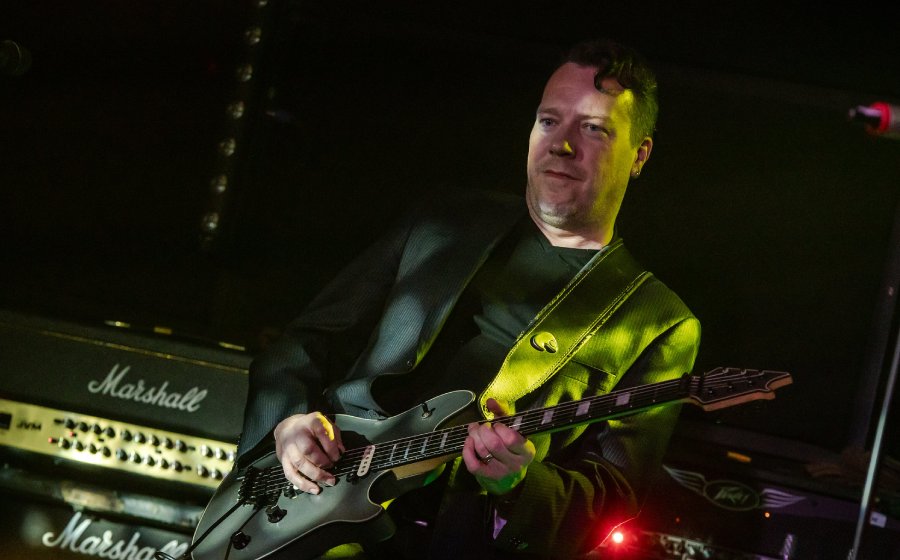
Jim: That’s a really difficult one for me to answer. A lot of people always said, “you’re a blues guy”, but actually I’ve always been into great songs. I love great guitar playing as well. But I can take or leave a lot of guitar playing because I think guitar players tend to concentrate more on the guitar. I loved working with Bernie because the songs were so good. He and I were massive Beatles fans. His sense of melody was so important and that’s where songs like ‘Here I go again’ come from. I’ve got a real fondness for the blues, although I prefer playing it to listening to it nowadays. My favourite artists are great songwriters. Queen and the Beatles were some of my favourite bands growing up, but I also loved Rory Gallagher because I liked his lyrics. I also loved 80s pop and rock music as well because they were generally great songs. If I just sit down with a guitar, I love great chord sequences and great melodies.
MGM: ‘Dead Man Walking’ is your third studio album. What was the catalyst for you wanting to pursue your own solo material?
Jim: I’d always wanted to do it and I did the first solo album nearly 20 years ago. It wasn’t great, and probably didn’t hit the mark of what I really wanted to do. I’ve been so lucky that I’ve gotten to work with some really great artists and really great singers; obviously Steve from FM and Robert Hart. I worked with a guy called Mike Farris from the States who’s a grammy winner. I’ve never really considered myself a lead singer, even though I’ve always done it. But I’ve been really lucky to do some really great gigs with people. I always felt like I would never quite achieve that myself. And then I joined FM, and that just took all my time up. Since I’ve been in the band we’ve done eight studio albums, three or four live albums, and three or four EPs and DVDs. It’s never-ending. I’ve got a little studio here at home, and actually Steve and I have just been working on new songs. If you’re in a band like FM, we’re always touring and always playing and always recording. Doing your own thing, especially if you’re doing it from scratch like I do, takes a lot of time and a lot of effort.
MGM: What does the album Dead Man Walking signify for you?
Jim: I was watching the ‘Green Mile’ for about the fifth time during lockdown, and when he said ‘Dead Man Walking’, I thought, that’s a great song title. It’s probably been used quite a lot. I’d done ‘Prodigal Son’, and I recorded a bit of the album a long time ago. I had three or four of the songs roughly in the can and just never got around to finishing it. When the pandemic happened, it gave me the time, and I finished it really quickly. I put it out thinking nobody would care about it, and then the reviews were really good. The bad thing about putting an album out that everybody likes is you’ve then got to try and follow it up, and equal or better it. Bernie Marsden asked me to go and do some songwriting with him and he had the opening riff to that song. We sat down and just went through four or five ideas and I said, can I pinch that acoustic opening riff, and he said, yeah, if you want it, you can use it. In fairness, he didn’t really contribute anything else towards the song, but if he hadn’t have given me that riff, there wouldn’t have been a song. So that’s where it came from. And then it just gave me an Americana theme.
MGM: Americana has become a bit of a thing in the last couple of years. There’s a lot of musicians that are really embracing that style; people like Elles Bailey or When Rivers Meet. Traditional blues music is also coming back, and Joe Bonamassa has made a big difference in this country. Many people have compared your sound to Joe Bonamassa. How do you feel about that comparison?
Jim: Well, it’s not what I consciously set out to do, but obviously we’re sitting in the same ballpark. It’s flattering because he’s a great guitar player and he’s a great singer and his output is massive and obviously he is who he is. So, in some respects, it’s really flattering when people have said that. Of course, on the other side of the coin, you’re setting yourself up for a bit of a fall because he’s the biggest blues rock guitar player in the world.
MGM: Hopefully you’ll get the invited to play his Mediterranean Cruise. It’s well known that between Joe Bonamassa, and Bernie Marsden, they own the largest collections of vintage guitars in the world. Did you ever get a chance to chat with Bernie about his guitars?
Jim: Well, I’ve probably played all of them, to be honest with you; many times. I spent a lot of time at Bernie’s house over the years, and he and his family were always very excellent hosts. There was nothing Bernie loved more than getting the guitars out and sitting up until 3-4am with his guitars. I got to play a lot of them. As for what will happen to them? I don’t know. He was in the process of starting to put some up for sale. I can’t speak for his family, but I guess they’ll probably sell some of them, because there’s so many of them. They might just want to keep a few for sentimental reasons.
MGM: The album has a conventional blues rock feel to it, but one song that stands out is the ballad ‘Journey Home’ which really shows off your voice. What inspired that song?
Jim: I’ve had the music for that song for years and I’d forgotten all about it. I’ve been doing some writing with Steve recently, and you go through your phone and you find some riffs and songs on there you forgot you’d come up with. And that was one. It was a song I couldn’t finish probably 20 years ago, but then I discovered it, and had a whole new vision for it. I’ve done a lot of touring in the last couple of years, and spent a lot of time stuck in airports or doing serious drives. You can get pretty homesick. So, it’s about finally getting to go home after being away.
MGM: ‘Road of Bones’ is another interesting title.
Jim: I saw a documentary on the TV, and in Siberia, there’s a road called the Road of Bones, where prisoners of war or political prisoners were forced to build this highway. It was pretty gruesome, and Stalin worked them to death. If they collapsed and keeled over and died, they basically just got put into the mix. And they reckon there’s something like 20,000 bodies within the surface of the road. It’s pretty grim. But, the song’s not literally about that subject … it’s a metaphor for an arduous journey.
MGM: You’ve also recorded a version of Rory Gallagher’s ‘I fall apart’ on this album. He seems to have been a consistent influence in your life. Why is his music so important to you?
Jim: I was a kid when I discovered him, and I really liked his energy. He was a bit more diverse than a lot of bluesy guitar players; he had a lot of folk and acoustic. He was very into his lyrics, and sometimes the lyrical parts of his songs were better than the musical part. He was a very truthful musician. And he never wanted to sell out at all. I was a really big fan of his in my teens and early twenties. You get into things and you drift away from it. Over the last twenty odd years I hadn’t listened to it much at all. It’s quite strange; the Rory Gallagher thing followed me about, but I never cultivated it at all, apart from just playing one or two of his songs here and there, Bernie Marsden wanted me to do this tribute thing, which we did for a year or two with a couple of Rory’s latter day band members. During the pandemic his long-term drummer and bass player, Jerry McAvoy and Brendan O’Neill, got in touch with me completely out of the blue and said, when we can travel again would you fancy doing some shows with the band, doing the Rory bit. That came at a pretty welcome time because there wasn’t much work going on at that point. And that song was a song I’d forgotten all about. They just reintroduced me to it. It’s not that obvious as a Rory Gallagher song, and we recorded a very different version. Jem Davis, and another guy who writes film scores, did an orchestral arrangement for it, and people really seem to like it.
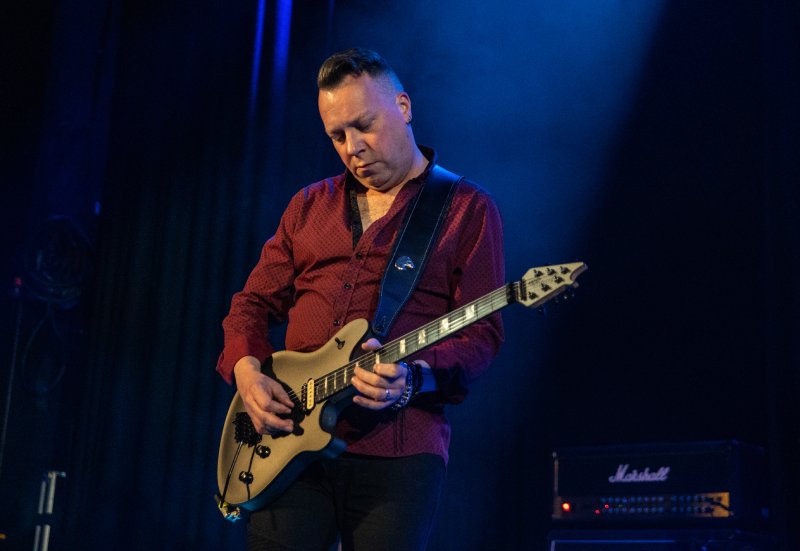
MGM: You did a handful of live dates earlier this year, following the album release, but your set largely focussed on the previous album ‘Prodigal Son’. Are you hoping to incorporate more of ‘Dead Man Walking’ into your current tour?
Jim: I’ve played ‘Heaven Above’ a couple of times, and quite a few people have asked for me to play ‘Journey Home’. I’ve got a load more solo stuff to announce for 2024, and I’ll be changing the set about a bit. ‘Hold on’ would be another good live track to do as well.
MGM: 2024 is also FM’s 40th anniversary and the band has lots of dates scheduled already to commemorate it. Some people will be aware that Jem has had his own trial and tribulations battling cancer in the past year. How is he doing?
Jim: He’s great. He had the all-clear and he really didn’t ever let it get to him at all. He just said, “This illness is irrelevant. I’ve just got to get rid of it and crack on”, which is what he seems to have done. He’s had the all-clear and he took two weeks off work. That’s all he did. He refused to not work. He just kept on doing everything that he normally did, apart from the couple of weeks where he really couldn’t. I think for him, mentally, he needed to do that. There’s no right or wrong way with how to deal with an illness like that. But, that’s how he dealt with it. So, he’s absolutely great. He was always a pretty big, well-built guy who goes to the gym, and he lost a lot of weight. But it’s all coming back now. It’s funny because he said he feels like a fraud because he didn’t feel poorly. He just had a sore throat like he’d just got a cold or something. He was in this hospital with really sick people. He said, “I wasn’t sick”. But he was. So, he’s been brilliant.
MGM: Another album you did in the last year was with ‘The Flood’, with Didge Digital, Chris Ousey, Nigel Glockler and Billy Sheehan; presumably largely written and recorded over the internet. Is there a future for that project?
Jim: It was a little bit done over the Internet, but not completely. There were sometimes more than one of us in the room together. Billy wasn’t, obviously, but that was a lockdown idea. It turned out better than I thought it was going to do. I’m going to write another one. I’ve probably got the time in January and I’m going to write another one, because it turned out to be really good fun and it was just a lockdown project. I’m not that keen on kind of writing records by mail. I did an album with Robert Hart about ten years ago, under the name of Diesel. And even though a lot of people thought it was a project record, we wrote it all together in the same room, and it was called ‘Into the Fire’. It was really good fun to do; Robert Hart, Jimmy Copley played drums, Adam Wakeman played keyboards, and a guy called Pat Davy played bass. But really sadly, Jimmy Copley got leukaemia and died just after we put it out. We did three gigs and then he got leukaemia and he passed away and, that knocked the winds out of the sails of doing any more with it. With the Flood, me and Chris did a lot of collaboration on that and I was in the studio with Nigel. So, it was not totally project and a lot of those project albums really are.
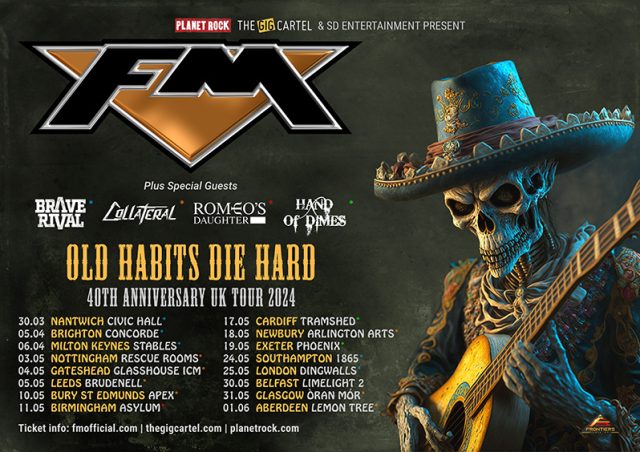
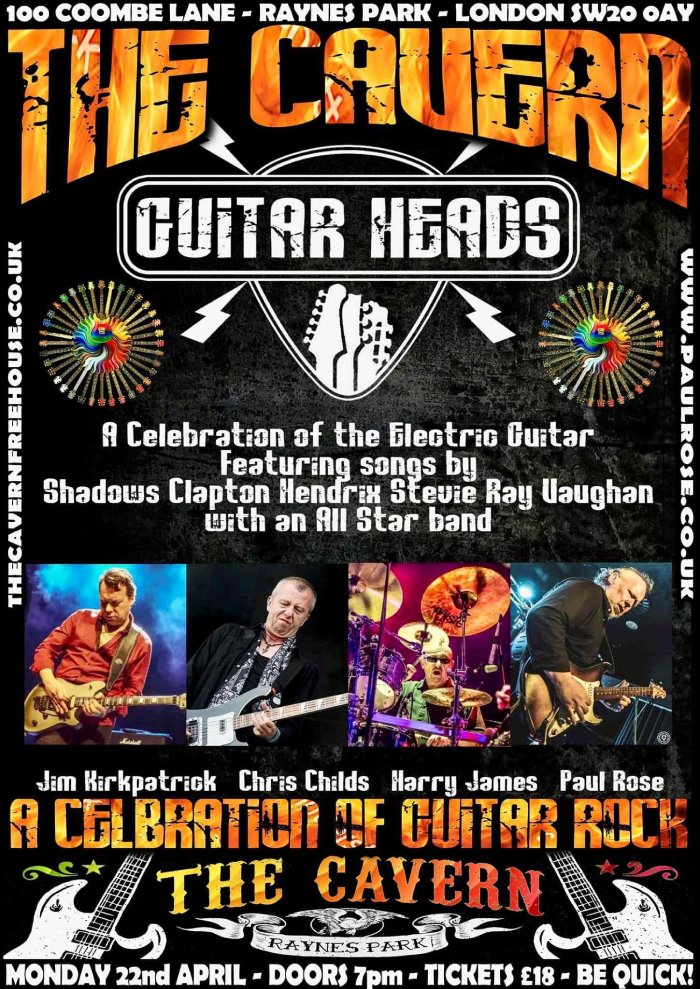
For more information:
www.facebook.com/jimkirkpatrickguitarist/
Jim will be playing solo dates throughout 2024:
18th January: The Spring, Havant
3rd February: UK Blues Rhythm & Rock Festival, Winter Gardens, Blackpool
4th February: Planet Rockstock
9th February: Blues at The Bay, Cleveland
10th March: Pizza Express, Soho
13th April: HRH Blues, Sheffield
14th April: Eleven, Stoke-on-Trent
Jim will also be performing some dates as ‘Guitar Heads’ alongside Paul Rose, and Thunder’s Harry James and Chris Childs
22nd April: The Cavern, Raynes Park
25th April: Barnoldswick Music & Arts Centre
26th April: Roxy, Ulverston
27th April: Steelies Club, Hartlepool
For More FM – Check out our Live review from The Forum last year here:


